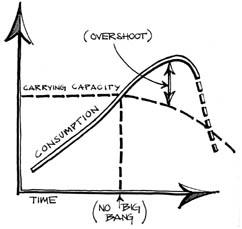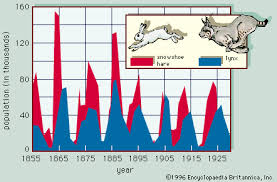The concept of overshoot is an important
one if one wishes to understand the changes that started 300 years ago at the
beginning of the industrial revolution and are now entering a turning point
that will take us to the next stage of overshoot.
So what is Overshoot?
 Overshoot is a simple concept that is described
easily by visuals. See the graph on the right, that is what overshoot looks
like, except that the variable is normally population not consumption, and it
has two sides one of an expanding and the other contracting but both are the
same process. Overshoot is just when consumption goes above the long-term
carrying capacity of the ecosystem and it normally keeps on climbing but at the
expense of a diminishing carrying capacity. This is okay until the point that
carrying capacity can no longer support the population and in response
population drops until it reaches carrying capacity that is now only a fraction
of what it was before. The upside may look rosy but from the perspective of an
individual in the population but once the decline happens, which is inevitable
once overshoot has appeared, the previous growth phase is a hindrance that
prolongs the length of time until sustainability is reached and reduces the end
carrying capacity.
Overshoot is a simple concept that is described
easily by visuals. See the graph on the right, that is what overshoot looks
like, except that the variable is normally population not consumption, and it
has two sides one of an expanding and the other contracting but both are the
same process. Overshoot is just when consumption goes above the long-term
carrying capacity of the ecosystem and it normally keeps on climbing but at the
expense of a diminishing carrying capacity. This is okay until the point that
carrying capacity can no longer support the population and in response
population drops until it reaches carrying capacity that is now only a fraction
of what it was before. The upside may look rosy but from the perspective of an
individual in the population but once the decline happens, which is inevitable
once overshoot has appeared, the previous growth phase is a hindrance that
prolongs the length of time until sustainability is reached and reduces the end
carrying capacity.
 What
happens next depends on the exact nature of the carrying capacity in question,
the species place in its ecosystem and the ecosystem itself. In the case of the
snowshoe hare and lynx, their populations continually cycle up and down. This
is characteristic of simpler ecosystems with a small amount of controls on
population. In the case of the snowshoe hare there is only the crude mechanism
of predator-prey to keep their populations in check and as the graph shows this
is not enough. But the north Atlantic Cod decline (due to overfishing), which
has permanently reduced the long-term carrying capacity of fishing in that
region, is permanent. This was caused by a shift in the Cods ecosystem, the
predator prey part, that has lowered the reproductive ability of Cod. The shift
was driven by the low cod numbers which allowed their prey to have a population
boom, the prey eat cod eggs and young (this is quite common) and now they stop
the Cod population from regaining its former levels. The north Atlantic cod
fisheries will now never regain their previous level of consumption without
another major ecosystem shift, one which would probably do massive harm
somewhere else.
What
happens next depends on the exact nature of the carrying capacity in question,
the species place in its ecosystem and the ecosystem itself. In the case of the
snowshoe hare and lynx, their populations continually cycle up and down. This
is characteristic of simpler ecosystems with a small amount of controls on
population. In the case of the snowshoe hare there is only the crude mechanism
of predator-prey to keep their populations in check and as the graph shows this
is not enough. But the north Atlantic Cod decline (due to overfishing), which
has permanently reduced the long-term carrying capacity of fishing in that
region, is permanent. This was caused by a shift in the Cods ecosystem, the
predator prey part, that has lowered the reproductive ability of Cod. The shift
was driven by the low cod numbers which allowed their prey to have a population
boom, the prey eat cod eggs and young (this is quite common) and now they stop
the Cod population from regaining its former levels. The north Atlantic cod
fisheries will now never regain their previous level of consumption without
another major ecosystem shift, one which would probably do massive harm
somewhere else.
The difference in these cases is a function
of the different complexity levels and its effects in their respective
ecosystems. In a complex ecosystem, overshoot is less common since more
controls are in place and step in more frequently when one or more fail. But as
the north Atlantic cod shows these complexities can also enable shifts in an
ecosystem to occur when overshoot does happen, such as when allowed by the use
of fossil fuels and advanced technology. The world we live in, as befits an
entire planet, is incredibly complex and the shifts that will occur will
dramatically change humanities position, power and abilities as the multitude
of ecosystems we live in change drastically in response to our decline.
We are at or close to the peak in
population or consumption levels and it is unlikely that we can hold of the
plunge much longer. The way down will be a long, slow and ragged process until
we reach our carrying capacity dictated by the planets biosphere and subject to
the changes induced by climate change.
No comments:
Post a Comment